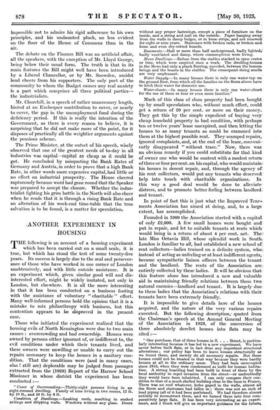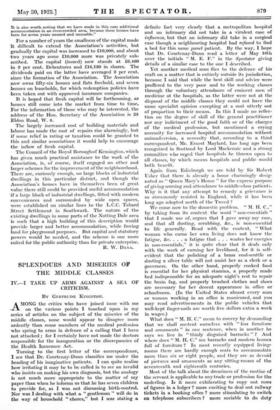;ANOTHER EXPERIMENT IN HOUSING
THE following is an account of a housing experiment which has been carried out on a small scale, it is true, but which has stood the test of some twenty-five years. Its success is largely due to the zeal and persever- ance of those who have worked in one corner of London unobtrusively, and with little outside assistance. It is an experiment which, given similar good will and dis- interested effort, might be widely imitated, not only in London, but elsewhere. It is all the more interesting in that it has been conducted on a business footing with the assistance of voluntary " charitable " effort. Many well-informed persons hold the opinion that it is a mistake to mix philanthropy with business, but this contention appears to be disproved in the present case.
Those who initiated the experiment realized that the housing evils of North Kensington were due to two main causes : overcrowding and bad ownership. Houses were owned by persons either ignorant of, or indifferent to, the evil conditions under which their tenants lived, and these owners were unwilling or unable to carry out the repairs necessary to keep the houses in a sanitary con- dition. That the conditions were (and in many cases, alas ! still are) deplorable may be judged from passages extracted from the (1923) Report of the Harrow School Missioner in whose district the experiment has been conducted :- " Came of Overerotading.—Thirty-eight persons living in an eight-roomed dwelling. Family of nine living in two rooms, 12 ft. by 10 ft., and 10 ft. by 8 ft.
Condition of Dwellings.—Leaking roofs, resulting in soaked ceilings and dripping walls. Windows without any glass. Doors
without any proper fastenings, except a piece of furniture on the inside, and a string and nail on the outside. Paper hanging away from the walls in damp bulges, or in loose strips, and not renewed; for eight or nine years. Staircases with broken rails, or broken and.: loose and even dry-rotted boards.
Basements —Half or more than half underground, badly lighted, badly ventilated and damp, where consumptives were living. Mews Dwellinge.—Refuse from the stables stacked in open crates or bins, which were emptied once a week. The dwelling-houses in the Mews had only a plank flooring, unceiled, between the human beings and the beasts in the stables. The consequent rising smells are very unpleasant.
Water Supply.—In many houses there is only one water-tap on the ground floor, from which all the families on the floors above have to fetch their water for domestic use.
Water-doeets.—In many houses there is only one water-closet for the use of three or four or even more families."
Much of this class of slum property had been bought up by small speculators who, without much effort, could get a return of 20 per cent. or more on their money, They got this by the simple expedient of buying very cheap leasehold property in bad condition, with perhaps ten or twelve years' lease unexpired, and then letting the houses to as many tenants as could be crammed into them at the highest possible rent. They stamped repairs, ignored complaints, and, at the end of the lease, conveni- ently disappeared " without trace." Now, there was an obvious remedy if you could substitute for that kind of owner one who would be content with a modest return, of three or four per cent. on his capital, who would maintain!
his houses in decent repair, and, through the agency of his rent collectors, would put any tenants who deserved: help into touch with charitable organizations. In this way a good deal would be done to alleviate distress, and to promote better feeling between landlord and tenant.
In point of fact this is just what the Improved Tene., ments Association has aimed at doing, and, to a large extent, has accomplished.
Founded in 1900 the Association started with a capital of only £2,000. A few small houses were bought and; put in repair, and let to suitable tenants at rents which.
would bring in a return of about 4 per cent. net. The late Miss Octavia Hill, whose splendid work in South; London is familiar to all, had established a new school of rent collectors—ladies trained on a definite system, who instead of acting as unfeeling or at least indifferent agents, became sympathetic liaison officers between the tenant and the landlord. The rents of the Association are; entirely collected by these ladies. It will be obvious that this feature alone has introduced a new and valuable aid in maintaining friendly relations between those two natural enemies—landlord and tenant. It is largely due. to these ladies that the Association's relations with their tenants have been extremely friendly.
It is impossible to give details here of the houses acquired, and the nature of the very various repairs executed. But the following description,' quoted from the Chairman's speech at the Annual General Meeting of the Association in 1923, of the conversion of three absolutely derelict houses into flats may be cited :— " One purchase, that of three houses in S. . ; . Street, is particu- larly interesting because it has led to a new experiment. We have never before built flats, or in fact done any important structural alterations ; our policy has been to leave houses structurally as we found them, and merely do all necessary repairs. But these houses could not be treated in that way because they were hardly houses at all in the ordinary sense. They had been unoccupied since 1916, when they were condemned as unfit for human habita- tion. A strong hoarding had been built in front of them by the local authority to repel invasion from the street—or undoubtedly they would have been inhabited. I can only compare their con- dition to that of a much shelled building close to the lines in France. There was no roof whatever, holes gaped in the walls, almost all the floors and staircases had fallen in ; there was not an inch of lead piping (all of it had been purloined). We had therefore almost entirely to reconstruct them, and we turned them into four com- paratively large flats. It lies been very interesting as an experi- ment, and I think will give us important guidance for the future;
It is also worth noting that we have made in this case additional accommodation in an overcrowded area, because these houses have been for seven years unused and unusable."
For a number of years the smallness of the capital made 'it difficult to extend the Association's activities, but ;gradually the capital was increased to £10,000, and about two years ago some £10,000 more was privately sub- scribed. The capital (issued) now stands at £6,400 in 3 per cent. Debentures and £16,130 in shares. The dividends paid on the latter have averaged 3 per cent. since the formation of the Association. The Association now owns fifty-six houses and flats freehold, and seven houses on leaseholds, for which redemption policies have been taken out with approved insurance companies. It is hoped that fresh capital will be forthcoming, as houses still come into the market from time to time. For the information of those who may be interested, the address of the Hon. Secretary of the Association is 28 Eldon Road, W. 8.
The largely increased cost of building materials and labour has made the cost of repairs rise alarmingly, but if some relief in rating or taxation could be granted to this and similar associations it would help to encourage the inflow of fresh capital. • The Council of the Royal Borough of Kensington, which has given much practical assistance to the work of the Association, is, of course, itself engaged on other and larger schemes for the improvement of the neighbourhood. There are, curiously enough, no large blocks of industrial dwellings in this particular district, and though the Association's houses have in themselves been of great value there still could be provided useful accommodation if a large block of industrial dwellings, fitted with modern conveniences and surrounded by wide open spaces, were established on similar lines to the L.C.C. Tabard Street Settlement in Southwark. The nature of the existing dwellings in some parts of the Notting Dale area is such that a high building of this description would provide larger and better accommodation, while freeing land for playground purposes. But capital and statutory powers would be needed, and the scheme is one more suited for the public authority than for private enterprise. R. W. DANA.











































 Previous page
Previous page